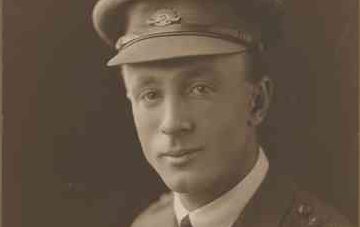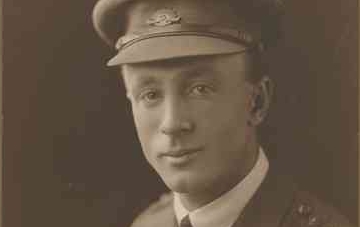

Ross Smith, image courtesy State Library of South Australia B6101
Settings
Smith, Ross – July 1915
On the 1st July they shot poor old Timmy. Poor chap he was too careless & got his head up too high on a nasty corner. We buried him next night & I have a photo of his grave. I missed him awfully & July was a rotten month for me. There was nothing doing at all & it was jolly hot, & the flies awful.
We could see Achi Baaba very well from our hill & used to watch the bombardments by the big naval guns. One bombardment lasted about 2 days with almost an incessant roar. The broadsides would burst 4 shells at a time & it looked as if nothing could live under such a fire but the hill is as strong as ever.
On July 22nd we expected the Turks to attack, it was their Constitutional day whatever that may be, but we all get ready & great preparations were made for their reception. We were in the trenches at the time so were very joyful. Sick men got well strangely quickly & everybody seemed polite & cheerful as is always the way when a scrap is expected after a long spell of quiet.
It was about full moon & you could see men sitting up till late putting the final bit of oil on their rifles & cleaning the ammunition & some sharpening their bayonets. We got a double issue of rum that night & were all ready next morning at “Stand to” but the beggars did not come!! The next & the next morning came & still the same & our spirits sank.
Fighting is a thing that grows on one & after one gets used to it he longs for hard fights & not this silly senseless trench work where one side seldom sees the other.
The nights were long & it was only by doing a turn now & then at observing & firing at flashes that I could keep awake. …
The Beach was the chief place of amusement and when not in the trenches we could nearly always get down for a swim every day. Just a narrow strip of stony beach about ½ mile long and 50 yds from water to the steep hills that the landing party first had to tackle. Here all the stores etc. were landed in big barges & there were cases & heaps of stuff piled all along to within 10 yds. of the water.
The Turks had a few guns that could pepper the whole place with shrapnel & 2 guns were particularily nasty. The one to the South was named “Beachy Bill” & the one to the North “Annafarta Annie”, so called because of a village in that direction.
In the hot weather hundreds of men would go down to swim at every hour of the day & the contempt they had for the shrapnel in some cases was extraordinary. They would just laugh & go on bathing but if too many shells were coming a whistle was blown & every one had to come ashore & take cover until they stopped. It was very amusing to see a man hop out of the water & grab his clothes off a barge & then take cover, swearing as only an Australian can because he had been disturbed at his bathe…
… One evening I was going to the beach & as one shell burst I saw a puttee & a coat blown high in the air. Coming back I saw the man being carried down & the stretcher bearers had just stopped for a spell. All his clothes except one boot & a puttee had been blown off & he was burnt almost black but alive & fairly cheerful. He asked for a drink and immediately a man handed him his bottle which he had just walked 1 ½ miles to fill. One gets used to such sights after a time but I have never forgotten that man, a hopeless case of course, lying there without a murmur.

